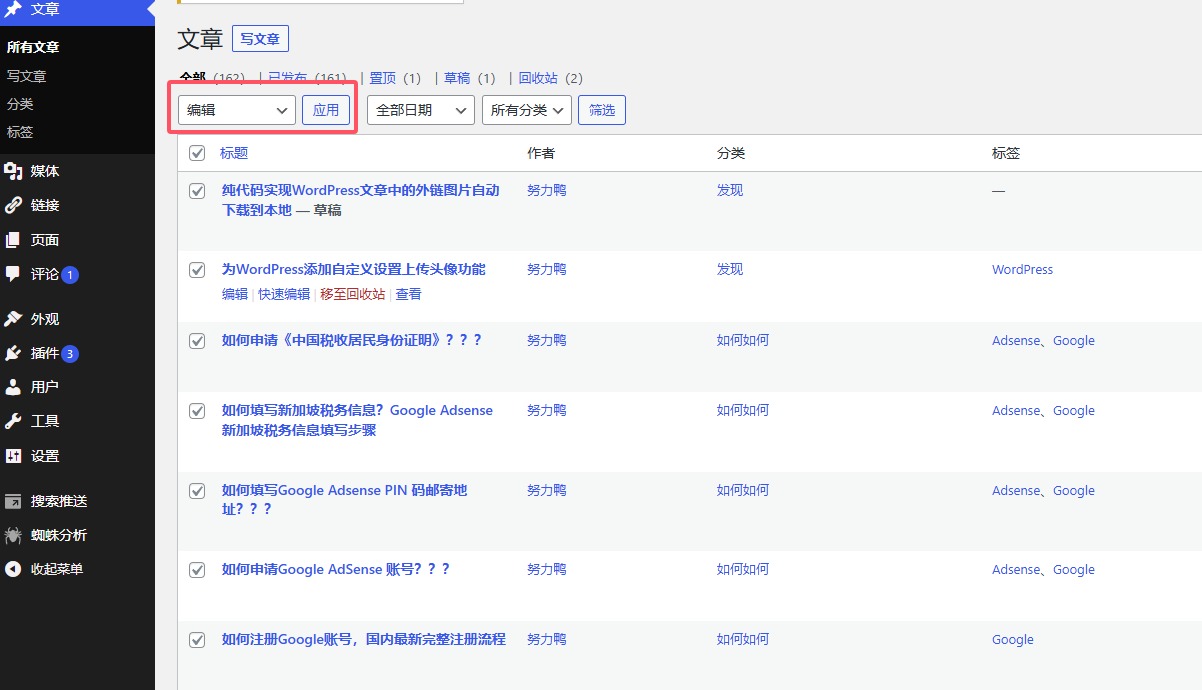WordPress作为一个非常简单易用的建站程序,我们在使用过程中,或多或少会转载一些他人的文章,如果遇到图片的话,还需要手动一个个上传,比较麻烦。今天和大家分享利用代码实现wordpress发布文章自动把远程图片保存到本地的方法。
直接将下面的代码,添加到当前主题函数模板 functions.php 中:
function ecp_save_post($post_id, $post) {
global $wpdb;
if($post->post_status == 'publish') {
$p = '/<img.*[\s]src=[\"|\'](.*)[\"|\'].*>/iU';
$num = preg_match_all($p, $post->post_content, $matches);
if ($num) {
$wp_upload_dir = wp_upload_dir();
set_time_limit(0);
$ch = curl_init();
curl_setopt($ch, CURLOPT_HEADER, false);
curl_setopt($ch, CURLOPT_RETURNTRANSFER, true);
curl_setopt($ch, CURLOPT_SSL_VERIFYPEER, false);
curl_setopt($ch, CURLOPT_FOLLOWLOCATION, true);
curl_setopt($ch, CURLOPT_MAXREDIRS,20);
curl_setopt($ch, CURLOPT_CONNECTTIMEOUT, 30);
$ecp_options = $_SERVER['HTTP_HOST'];
foreach ($matches[1] as $src) {
if (isset($src) && strpos($src, $ecp_options) === false) {
$file_info = wp_check_filetype(basename($src), null);
if ($file_info['ext'] == false) {
date_default_timezone_set('PRC');
$file_name = date('YmdHis-').dechex(mt_rand(100000, 999999)).'.tmp';
} else {
$file_name = dechex(mt_rand(100000, 999999)) . '-' . basename($src);
}
curl_setopt($ch, CURLOPT_URL, $src);
$file_path = $wp_upload_dir['path'] . '/' . $file_name;
$img = fopen($file_path, 'wb');
curl_setopt($ch, CURLOPT_FILE, $img);
$img_data = curl_exec($ch);
fclose($img);
if (file_exists($file_path) && filesize($file_path) > 0) {
$t = curl_getinfo($ch, CURLINFO_CONTENT_TYPE);
$arr = explode('/', $t);
if (pathinfo($file_path, PATHINFO_EXTENSION) == 'tmp') {
$file_path = ecp_handle_ext($file_path, $arr[1], $wp_upload_dir['path'], $file_name, 'tmp');
} elseif (pathinfo($file_path, PATHINFO_EXTENSION) == 'webp') {
$file_path = ecp_handle_ext($file_path, $arr[1], $wp_upload_dir['path'], $file_name, 'webp');
}
$post->post_content = str_replace($src, $wp_upload_dir['url'] . '/' . basename($file_path), $post->post_content);
$attachment = ecp_get_attachment_post(basename($file_path), $wp_upload_dir['url'] . '/' . basename($file_path));
$attach_id = wp_insert_attachment($attachment, ltrim($wp_upload_dir['subdir'] . '/' . basename($file_path), '/'), 0);
$attach_data = wp_generate_attachment_metadata($attach_id, $file_path);
$ss = wp_update_attachment_metadata($attach_id, $attach_data);
}
}
}
curl_close($ch);
$wpdb->update( $wpdb->posts, array('post_content' => $post->post_content), array('ID' => $post->ID));
}
}
}
function ecp_handle_ext($file, $type, $file_dir, $file_name, $ext) {
switch ($ext) {
case 'tmp':
if (rename($file, str_replace('tmp', $type, $file))) {
if ('webp' == $type) {
return ecp_image_convert('webp', 'jpeg', $file_dir . '/' . str_replace('tmp', $type, $file_name));
}
return $file_dir . '/' . str_replace('tmp', $type, $file_name);
}
case 'webp':
if ('webp' == $type) {
return ecp_image_convert('webp', 'jpeg', $file);
} else {
if (rename($file, str_replace('webp', $type, $file))) {
return $file_dir . '/' . str_replace('webp', $type, $file_name);
}
}
default:
return $file;
}
}
function ecp_image_convert($from='webp', $to='jpeg', $image) {
$im = imagecreatefromwebp($image);
if (imagejpeg($im, str_replace('webp', 'jpeg', $image), 100)) {
try {
unlink($image);
} catch (Exception $e) {
$error_msg = sprintf('Error removing local file %s: %s', $image,
$e->getMessage());
error_log($error_msg);
}
}
imagedestroy($im);
return str_replace('webp', 'jpeg', $image);
}
function ecp_get_attachment_post($filename, $url) {
$file_info = wp_check_filetype($filename, null);
return array(
'guid' => $url,
'post_type' => 'attachement',
'post_mime_type' => $file_info['type'],
'post_title' => preg_replace('/\.[^.]+$/', '', $filename),
'post_content' => '',
'post_status' => 'inherit'
);
}
add_action('save_post', 'ecp_save_post', 120, 2);
操作说明
单篇操作
只需要编辑文章点击更新按钮,就可以将文章中的外链图片下载到本地并替换链接。
不过逐个编辑文章不仅繁琐而且工作量不小,这里教大家一个小技巧,可以批量下载文章中的外链图片。
批量操作
该插件的代码不仅可以在正常的编辑页面点击更新按钮触发下载功能,而且可以在后台所有文章列表页面中触发下载图片功能。
进入WP后台,文章→所有文章,进入文章管理页面,勾选“标题”全选当前页面的所有文章,并选择“编辑”,并点击“应用”按钮。
切记,不要更改批量编辑中的任何设置,只需单击 “更新”即可。

这个过程将触发检查所有选定的文章,并自动下载外链图片!
 努力鸭
努力鸭